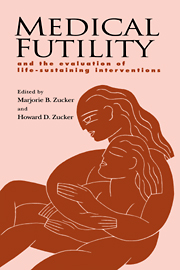Book contents
- Frontmatter
- Contents
- Preface
- Foreword
- Contributors
- 1 Medical futility: a useful concept?
- 2 Death with dignity?
- 3 Physicians and medical futility: experience in the critical care setting
- 4 Physicians and medical futility: experience in the setting of general medical care
- 5 Futility issues in pediatrics
- 6 Medical futility: a nursing home perspective
- 7 Alternative medicine and medical futility
- 8 How culture and religion affect attitudes toward medical futility
- 9 When religious beliefs and medical judgments conflict: civic polity and the social good
- 10 Conflict resolution: experience of consultation-liaison psychiatrists
- 11 Ethics committees and end-of-life decision making
- 12 The economics of futile interventions
- 13 Medical futility: a legal perspective
- 14 Professional and public community projects for developing medical futility guidelines
- 15 Community futility policies: the illusion of consensus?
- 16 Not quite the last word: scenarios and solutions
- Index of cited authors, cases, and statutes
- Subject index
13 - Medical futility: a legal perspective
Published online by Cambridge University Press: 11 September 2009
- Frontmatter
- Contents
- Preface
- Foreword
- Contributors
- 1 Medical futility: a useful concept?
- 2 Death with dignity?
- 3 Physicians and medical futility: experience in the critical care setting
- 4 Physicians and medical futility: experience in the setting of general medical care
- 5 Futility issues in pediatrics
- 6 Medical futility: a nursing home perspective
- 7 Alternative medicine and medical futility
- 8 How culture and religion affect attitudes toward medical futility
- 9 When religious beliefs and medical judgments conflict: civic polity and the social good
- 10 Conflict resolution: experience of consultation-liaison psychiatrists
- 11 Ethics committees and end-of-life decision making
- 12 The economics of futile interventions
- 13 Medical futility: a legal perspective
- 14 Professional and public community projects for developing medical futility guidelines
- 15 Community futility policies: the illusion of consensus?
- 16 Not quite the last word: scenarios and solutions
- Index of cited authors, cases, and statutes
- Subject index
Summary
For the past two decades, much of the medical, ethical, and legal discussion about death and dying has focused on the right of individuals to reject treatments that only prolong the dying process. Yet if the volume of literature devoted to medical futility in recent years is any indicator, a significant number of individuals are now clamoring for the very treatments that others fought to reject.
Much of this discussion concerning medical futility comes from a medical or philosophical perspective. On the few occasions that the judicial system has addressed the subject of medical futility, it has applied the law unevenly and often without much reflection about the consequences of its rulings, leaving clinicians and patients with little guidance. Statutes that address medical futility directly are fewer still and have proved ineffective at resolving the hypothetical and real problems that the futility debate creates for clinicians and patients across the country.
In this chapter, we survey the legislation and court decisions that have specifically addressed the issues of medical futility and explore whether the established right to refuse treatment can inform the futility debate and the right to receive treatment, or whether a new set of laws and legal principles is needed.
The emergence of the futility problem
A consensus on what constitutes futile treatment remains elusive. However, conflicts over medical futility are beginning to surface as a new type of end-of-life decision-making case.
- Type
- Chapter
- Information
- Medical FutilityAnd the Evaluation of Life-Sustaining Interventions, pp. 136 - 154Publisher: Cambridge University PressPrint publication year: 1997
- 4
- Cited by

